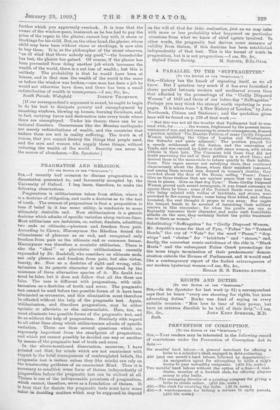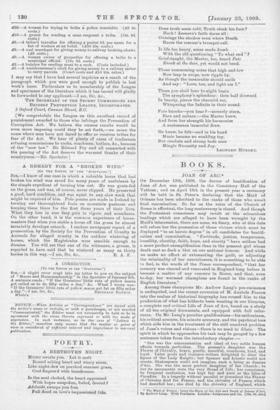PREVENTION OF CORRUPTION.
LTO THE EDITOR OF TRH "SPZOTAT011."J
Sin,—Your readers may be interested in the following record of convictions under the Prevention of Corruption Act to date :—
Six months' hard labour.--A general merchant for offering a bribe to a solicitor's clerk engaged in debt-collecting.
460 (and one month's hard labour, followed by deportation).— An emigration agent for attempting to bribe a ship's doctor to pass unhealthy emigrants. (410 10s. costs.) Two months' hard labour without the option of a fine.—A coal- dealer, member of a football club, for offering players money to play badly. 460.—The managing director of a printing company for giving a bribe to obtain orders. (410 10s. costs.)
460.—The clerk for receiving the bribe. (42 2s. costs.) 410.—A warehouseman for bribing a carman to carry parcels. (410 10e. costs.) £ 10.—A woman for trying to bribe a police constable. (.e2 55. costs.)
410.—A grocer for sending a mess sergeant a bribe. (125. Gd. costs.) £ 5.—A tailor's traveller for offering a porter 3d. per name for a list of visitors at an hotel. (..£10 10s. costs.)
£5.—A coal merchant for giving money to railway booking-clerks. (.£3 costs.)
.£5.—A woman owner of properties for offering a bribe to a municipal official. (12s. Gd. costs.) .C2.—A butcher for sending moat to a cook. (Costs included.) 41.—A warehouseman's clerk for giving money to a railway carter to carry parcels. (Court costs and £10 10s. extra.)
I may say that I have had several inquiries as a result of the paragraph which you ware good enough to publish in last week's issue. Particulars as to membership of the League and specimens of the literature which it has issued will gladly
be forwarded to any applicant.—I am, Sir, &o.,
THE SECRETARY OF THE SECRET COMMISSIONS AND BRIBERY PREVENTION LEAGUE, INCORPORATED.
8 Oxford Court, Cannon Street, E.C.
[We congratulate the League on this excellent record of punishment awarded to those who infringe the Prevention of Corruption Act. We believe the unseen results would be even more imposing could they be set forth,—we mean the cases where men have not dared to offer or receives bribes for fear of the Act. We hear of plenty of cases of tradesmen refusing commissions to cooks, coachmen, butlers, &c., because of the "new law." Sir Edward Fry and all connected with the passing of the Act deserve the warmest thanks of their countrymen.—En. Spectator.1







































 Previous page
Previous page